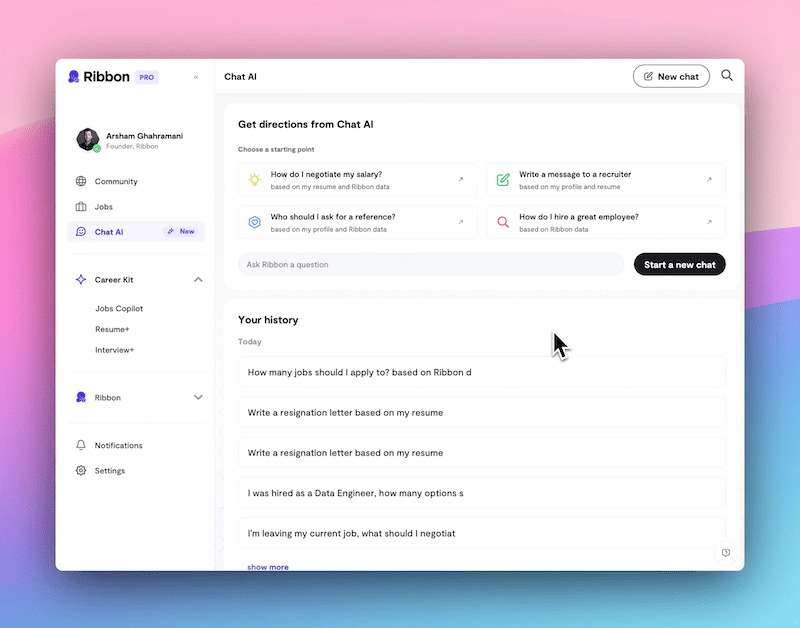A Guide to Culture Interview with Examples of Questions

Culture-fit interviews are a delicate but decisive piece of the interviewing process.
Not least because a poor cultural fit can lead to increased turnover and affect team dynamics.
In this guide, you'll learn everything you need to know about culture interviews: when to conduct them, the best questions to ask, and how to assess culture fit.
What is a Culture Interview?
A culture interview is a conversation in your hiring process that helps you determine whether a candidate’s values, work habits, and behaviors match your organization’s culture. Instead of focusing solely on technical skills or experience, a culture interview is designed to see how well a candidate will fit into your work environment.
Every company has a specific culture that is shaped by its values, mission, and the behaviors of its employees. Conducting culture interviews helps you determine if a potential hire can succeed in this environment. For example, if your organization emphasizes collaboration and transparency, you need to find candidates who are comfortable sharing ideas openly and working closely with others.
Culture interviews are particularly useful when you’re filling roles where team dynamics are essential to success. For example, if you’re hiring for a role that requires constant collaboration with others, it’s crucial to understand how well the candidate works in a group setting. On the other hand, if the position involves significant independence, you need to confirm that the candidate is comfortable making decisions on their own and managing their workload without much supervision.
It’s also a good idea to conduct a culture interview when hiring for leadership positions. Leaders play a major role in shaping and maintaining company culture, so it’s essential to ensure they embody the values that are important to your organization. A leader who doesn’t align with the company’s culture can negatively impact team morale and productivity, which makes this step critical.
Culture interviews are also beneficial for candidates. They provide insight into your company’s atmosphere and work style, helping them determine if it’s a place where they would be happy and productive.
When Should You Conduct a Culture Interview?

You should conduct a culture interview after you have assessed a candidate's technical skills and qualifications. This means incorporating the culture interview into the later stages of your hiring process, ideally once you are confident that the candidate has the necessary experience and abilities to perform the job. At this point, you have narrowed down your pool to individuals who can do the work, and now you want to ensure that they are also a good cultural fit for your team.
By conducting the culture interview toward the end of the process, you ensure that you’re not spending too much time on candidates who may be technically capable but unsuitable for your company’s culture.
Best Questions to Ask in a Culture Interview

Asking the right questions during a culture interview is crucial to understanding whether a candidate will be a good fit for your organization. The questions you choose should align with your core values and the specific traits you’re looking for in new hires :
1. Tell me about a time when you faced a challenge in a team setting. How did you handle it?
This question helps you gauge how the candidate approaches teamwork and problem-solving. You want to see if they can remain positive during challenges and work collaboratively to resolve issues. Look for answers that demonstrate resilience, cooperation, and a solution-oriented mindset.
2. What kind of work environment helps you thrive?
With this question, you can understand if the candidate’s ideal work environment matches what your organization offers. For example, if they prefer a highly collaborative space but your company requires a lot of independent work, this might indicate a mismatch. Listen for specifics about the type of environment where they do their best work and whether it matches what you can provide.
3. How do you handle feedback, especially if it’s critical?
Receiving and acting on feedback is a key part of maintaining a healthy workplace culture. This question reveals how open the candidate is to improvement. Look for responses that show they value feedback, take it constructively, and use it to grow. Someone who becomes defensive or dismissive may struggle in a culture where feedback is essential for growth.
4. Can you describe a work experience where you went above and beyond what was required?
This question helps you identify candidates who take initiative and are motivated by more than just the basic requirements of their job. Look for examples where the candidate proactively took steps to add value, showing their commitment to their work and willingness to contribute to the company’s success.
5. What does “success” mean to you in the context of a team?
The candidate’s definition of success will give you insight into their values and how they measure achievements. It will also help you determine if their vision aligns with your team’s goals. Look for an answer that emphasizes shared achievements, team growth, and collaboration, rather than only focusing on individual accolades.
6. How do you deal with conflicts in the workplace?
Conflict resolution is a key part of maintaining a positive work environment. This question helps you determine how well the candidate can handle disagreements or conflicts. Look for answers that show they are willing to address conflicts directly but respectfully, and that they aim for solutions that benefit everyone involved.
7. Can you give an example of how you adapted to a major change at work?
Adaptability is essential in any workplace, especially if your organization experiences frequent changes. This question helps you assess how flexible and resilient the candidate is when faced with changes. Look for answers that demonstrate a willingness to learn and adapt, even in difficult situations.
8. What motivates you to do your best work every day?
Understanding a candidate's motivations is crucial for determining if they will be engaged and productive in your company. Look for intrinsic motivations, such as a desire to contribute to a meaningful mission or the satisfaction of overcoming challenges. This will help you gauge if their motivations align with what your organization can offer.
9. How would your previous coworkers describe your role in the team?
This question gives insight into how the candidate perceives themselves and their impact on others. Look for answers that reflect qualities you value, such as being a reliable team player, a supportive colleague, or someone who takes initiative. The candidate's response will help you assess how they fit into the dynamic of your current team.
10. Why do you want to work here?
This question helps you understand if the candidate is genuinely interested in your company and aligns with your culture. Look for specific reasons that show they’ve done their research and connect with your company’s values and mission. A candidate who can clearly articulate why they are drawn to your organization is more likely to be committed and engaged.
Best Practices to Conduct a Culture Interview and Assess Culture Fit

Conducting a successful culture interview requires careful planning and consistent evaluation methods. Here are some best practices that can help you get the most accurate assessment of a candidate's cultural fit.
1. Prepare a Standardized Set of Questions
To ensure fairness and consistency, prepare a standardized set of questions that you use for every candidate. This approach ensures that each candidate is evaluated on the same criteria, which makes it easier to compare responses and identify the best fit for your organization.
2. Engage Multiple Interviewers
Involve team members from different departments in the interview process to get diverse perspectives. Culture fit is subjective, and involving multiple interviewers helps eliminate bias by incorporating different viewpoints. Team members from various roles will bring different experiences to the table, providing a comprehensive assessment of how well the candidate aligns with the company’s culture.
3. Look for Behavioral Examples
When asking questions, encourage candidates to provide specific examples from their past experiences. This helps you understand how they have acted in situations similar to those they may encounter at your company. Look for real-life scenarios where their actions reflect the values and behaviors your organization promotes.
4. Assess Alignment with Core Values
Keep your company’s core values front and center during the culture interview. Whether it’s teamwork, integrity, innovation, or customer service, evaluate how well the candidate’s answers align with these values. Use a scoring system if necessary, to quantify how well a candidate aligns with each value. This makes it easier to compare candidates objectively.
5. Provide Realistic Insights into Your Culture
Be transparent about your company’s culture, including both the positives and the challenges. This helps set realistic expectations for the candidate and allows them to decide if the work environment is right for them.
7. Focus on Long-Term Fit
Look beyond immediate job requirements and assess whether the candidate is likely to grow with the company. Consider their career goals and whether they align with your organization’s.
Noota: Get the Right Takeaways from Your Culture Interviews

Conducting culture interviews can be challenging, especially when it comes to capturing all the details and evaluating the responses consistently. Noota helps simplify this process by providing the tools you need to make the most of each interview.
- Record and Transcribe Your Culture Interviews Automatically : Taking detailed notes during an interview can be difficult while also staying fully engaged with the candidate. With Noota, you can record and transcribe your culture interviews automatically. This allows you to focus on the conversation without worrying about missing important details.
- Generate Structured Summaries : Once the interview is over, reviewing hours of recorded material can be time-consuming. Noota solves this by generating structured summaries that highlight the key points of each interview.
- Seamless Team Collaboration : Hiring decisions are rarely made by just one person. With Noota, you can easily share interview recordings, transcripts, and summaries with your hiring team. This ensures that everyone involved in the decision-making process has access to the same information, enabling mSharing insights efficiently helps your team make consistent decisions and ensures that the best cultural fit is identified.
- Evaluate Consistently with Custom Templates : Noota also allows you to create custom evaluation templates that align with your company’s core values. You can use these templates to assess candidate responses systematically, ensuring that all interviewers are evaluating cultural fit based on the same criteria.
Want to streamline and get more insights from your cultural-fit interviews ? Try Noota for free.
Leverage your Interview Data
AI interview notes, scorecard, follow-up, ATS integration, and more...
Related articles

Forget note-taking and
try Noota now
FAQ
In the first case, you can directly activate recording as soon as you join a videoconference.
In the second case, you can add a bot to your videoconference, which will record everything.
Noota also enables you to translate your files into over 30 languages.

.svg)
.svg)

.webp)

.png)


.svg)
